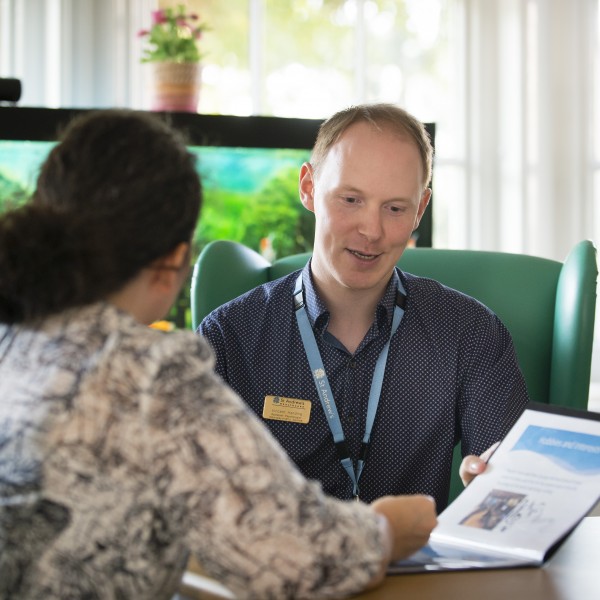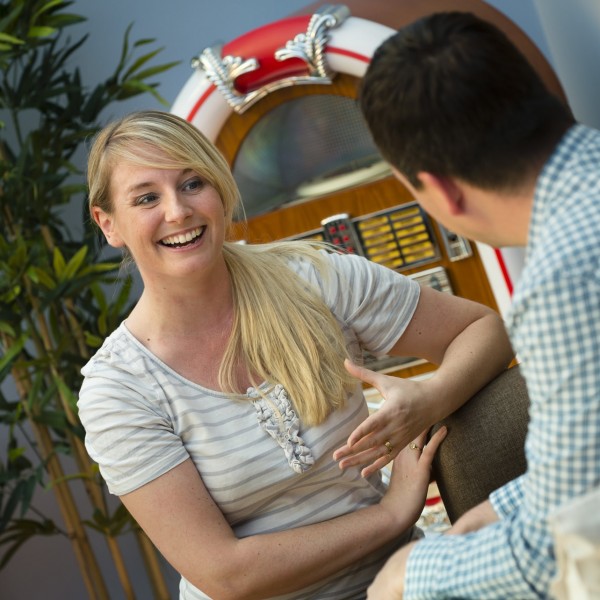01604 872754
 Email
Email
Our on-site, specialist multi-disciplinary team (MDT) mean that we have the breadth of knowledge and expertise to support people who have a recent or long-standing brain injury to progress to different stages of the pathway. This knowledge combined with our range of bespoke environments mean that we are able to meet the needs of patients that may present with a complex layering of neurocognitive, neurobehavioural and physical deficits as a result of acquired or traumatic brain injury.
As the first specialist UK neurobehavioural unit, Kemsley has, for over 40 years, led the delivery of person-centred care for people with a range of complex cognitive, physical and psychological needs following a brain injury. We help people to live well following a brain injury and equip them with the tools and ability to face the challenges they may encounter during their recovery.
Opened in April 2024 - Church ward is the fifth specialist neurobehavioral ward within our male brain injury pathway. As well as delivering vital additional beds, Church will create an additional step in St Andrew's brain injury pathway.
Our psychiatric neurobehavioural and neurorehabilitation services support people who are experiencing significant psychological and behavioural symptoms following a brain injury alongside the more obvious physical consequences.
Many brain injury services tend to prioritise physical rehabilitation, however at St Andrew’s we have the knowledge and expertise within our on-site multi-disciplinary teams to support a person’s complex and individual neurocognitive and neurobehavioural rehabilitation needs alongside their physical deficits following a significant and traumatic brain injury.
Patients that have sustained a brain injury may struggle to understand that people are there to help them and instead they may feel that people are trying to persecute them or harm them, this can manifest itself in agitation and behaviours that challenge, which in some cases leads them to the criminal justice system.
Following significant trauma people can struggle with the loss of a rich and fulfilling life they had before their brain injury. Grief associated with the inability to walk, speak and make judgements can be significant and is understandably hard to process for many individuals.
Dr Lorraine Childs highlights the value of co-production between patients and the clinical staff. It is something, which has become fundamental to care design and planning across our Neurorehabilitation services.
On Rose ward, our forensic acquired brain injury service, patients and staff have developed a neuro-behavioural programme. Patients wanted a system that recognised and rewarded settled behaviour and helped to evidence their readiness to move forward. From this, a Traffic Light System (TLS) was developed, which provides daily feedback about behavioural progress. The patients like the simple standard of ‘aim for green’ and have observed that people who remain settled on green move on more quickly. Following the introduction of the TLS, patients asked for longitudinal charts, so they knew how long they had been on green.
They chose a ward motto 'Don't count the days, make the days count' - based on a quote by Mohammed Ali.
You can read in full the interviews with some of our Brain Injury MDT here
Dr Lorraine Childs interview Dr Vishelle Kamath interview Emma Wakeman interviewPatients then requested acknowledgment for staying on green, so the Rose Exchange was introduced. On intervening weeks a patient-led Better Lives Group, based on the Good Lives Model reviews the TLS and develops other therapeutic interventions, such as the Healthy-Living Programme that included educational sessions about obesity and type II diabetes. Recent, patient feedback on these programmes was positive. Comments included, “It is a great incentive to do well” and “It makes me feel good about myself” whilst the ward saw a 37% fall in aggressive episodes during the period vs. last year, showing the value of co-production and patient engagement.
Across the Neuropsychiatry service co-production has led to:

Our brain injury services accept referrals nationally, but support the healthcare agenda to provide care as close to home as possible for people in the East Midlands.
Many referrals come from acute trauma centres or Intensive Therapy Units (ITUs) where the patient has been sedated or intubated for long periods of time. For Rose ward, patients are often transferred from the criminal justice system or other psychiatric units who have not been able to support or treat a patient's complex mental health needs.
We work with local Brain Injury Case Managers, Neuro Navigators, Clinical Commissioning Groups and Foundation Trusts to support complex brain injury cases.

With a diverse range of environments from medium secure to enhanced inpatient rehabilitation and transitional hospital registered housing in a community setting we can personalise care according to the unique physical, psychological, emotional and social needs of each patient (including those detained under the Mental Health Act) with a focus on neurobehavioural rehab.
Our Multi-disciplinary Team (MDT) construct programmes of enablement that support patients as they progress through our service to a place of least restriction, and utilise a full range of psychological and occupational therapy programmes.
We accept patients at all stages of recovery, from initial assessment and stabilisation, to those further along their rehab journey who require greater integration in to community living.
Our facilities for patients with a brain injury
We deliver personalised care through a range of specialist interventions for adults with acquired brain injury whose complex behaviour impedes their ability to improve their quality of life, or who present with a risk profile which local acute or rehabilitation services may struggle to care for. Our single sex services offer a continuity of care from medium secure to enhanced inpatient rehabilitation and hospital registered housing in the community.
Our gender specific wards consist of:
Rose – Medium Secure admission, assessment and rehabilitation ward for males typically with a forensic background. One of only three medium secure services in the country
Tallis – Admission, assessment and rehabilitation ward for males
Church - Admissions, assessment and rehabilitation ward for males
Tavener – Assessment and rehabilitation wards and flats for males
Allitsen - Rehabilitation and recovery for males
Elgar - Admission, assessment and rehabilitation ward for females
19 The Avenue – Transitional living houses for males and females
38 Berkeley Close – Transitional living flats for males and females.
Our wards for adults with a brain injury
Much of the work we do supports individuals to understand what has happened to them, identifying where they now need support and what their needs will be in the future.
We often see people as they start to process what has happened to them and the impact of their trauma or illness progression, they may be having to come to terms with not being able to care for themselves as they had done and some individuals will be experiencing significant memory loss in the form of post traumatic amnesia (PTA). Patients can also become agitated and distressed by their inability following an ABI to learn and retain new information.
Our specialist Multi-disciplinary teams (MDT) support patients with complex brain injury and behaviours that challenge to process their environment, come to terms with the trauma they have experienced and to develop coping strategies as they move forwards with their recovery. Some people may have an evident mental disorder as a consequence of their brain injury and they may become psychotic or depressed.
Our teams are skilled and equipped to understand and assess that person; their injury, how they are thinking and how they regulate emotion, allowing the development of a tailored treatment plan which relies on a co-produced approach between the person we are caring for and our specialist team. We aim to support a person with complex brain injury and trauma to achieve a level of functioning as close to their baseline prior to their injury as is possible.
Interventions include holistic neurobehavioural and neurocognitive programmes designed to build a person's skills and confidence around; communication, volition, motivation and physical capabilities. Clinical and therapeutic approach combined with easy to access daily living environments and vocational opportunities combine to provide a structure that supports patients in learning and re-building skills that are required for daily life and that have been lost due to their brain injury.

Within our ABI service we recognise that offering support to family and carers is key as they too will likely be struggling to come to terms with what has happened to their loved one. Our clinical teams work with family, carers and loved ones to: